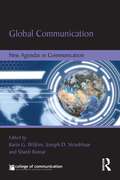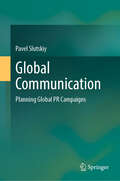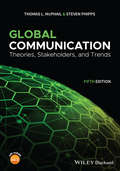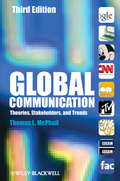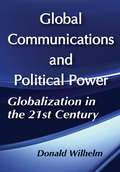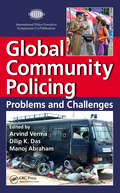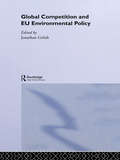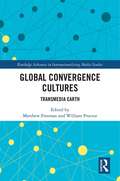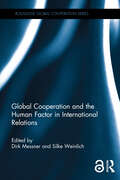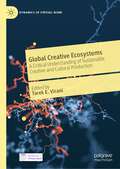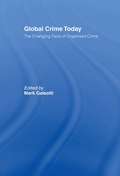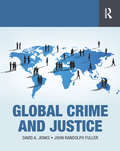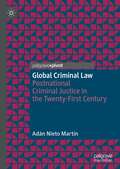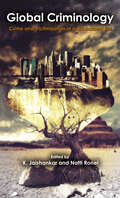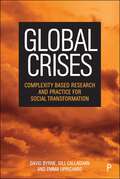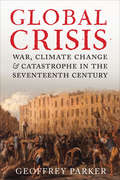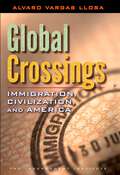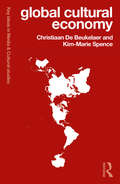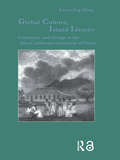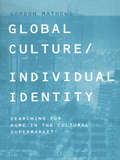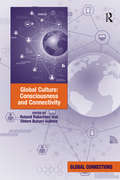- Table View
- List View
Global Communication: New Agendas in Communication (New Agendas in Communication Series)
by Shanti Kumar Joseph D. Straubhaar Karin G. WilkinsThis volume interrogates what "global" means in the context of "communication," and who benefits from global communication practices and industries. Emerging scholars contribute their unique perspectives in communication scholarship, charting innovative directions for research that connects empirical evidence with pressing questions of social significance. This critical reflection leads to considering problems that result from the way global communication becomes mobilized, in the practice of journalism and development as well as the ICT industry. Global Communication defines the term "globalization," through understanding the cultural geography of global, regional, national, and local media. Critical evaluations of media production, distribution, and consumption practices, within cultural contexts, offer insights into how people "mediate" the global. Chapters draw attention to communications in Latin America, the Arab World, and South Asia, complicating territorial boundaries and exploring how local audience and industry practices work within global as well as local configurations.
Global Communication: Planning Global PR Campaigns
by Pavel SlutskiyThis textbook equips students with essential media and communication skills for today&’s interconnected world. Developed as a key companion text for the Global Communication Project (GlobCom), an initiative spanning five continents, the book presents the key concepts that underpin effective communication on a global scale and guides the reader through project development, covering cross-cultural communication processes and virtual collaboration dynamics. In today&’s rapidly evolving global communication landscape, professionals with expertise in global public relations (PR) are in high demand. For students looking to develop their global PR competences, the GlobCom Project offers an authentic experience aligned with industry expectations and is a platform for related courses to draw from. This textbook provides both theoretical and practical material to enhance students&’ learning experience, and serves as a valuable resource for lecturers and advanced undergraduate and graduate students in the media, marketing communication, and PR fields. By offering insights into the complexities of international communication, it helps aspiring and current professionals become skilled and globally aware in their approach to global communication.
Global Communication: Theories, Stakeholders, and Trends
by Thomas L. McPhail Steven PhippsDiscusses the players, theories, and trends that affect how the world communicates and gets their information This book is a definitive text on multinational communication and media conglomerates, exploring how global media influences both audiences and policy makers around the world. Comprehensively updated to reflect the many fast moving developments associated with this dynamic field, this new edition investigates who and where certain cultural products are coming from and why, and addresses issues and concerns about their impact all over the world. Global Communication: Theories, Stakeholders, and Trends, 5th Edition has been thoroughly updated with new content, trends, and conclusions, all based on the latest data. The book examines broadcasting, mass media, and news services ranging from MSNBC, MTV, and CNN to television sitcoms and Hollywood export markets. It investigates the roles of the major players, such as News Corp, Sony, the BBC, Disney, Bertelsmann, Viacom, and Time Warner, and probes the role of advertising and the Internet and their ability to transcend national boundaries and beliefs. New chapters look at the growing importance and significance of other major regions such as the media in the Middle East, Europe, and Asia. • Outlines the major institutions, individuals, corporations, technologies, and issues that are altering the international information, telecommunication, and broadcasting order • Focuses on a broad range of issues, including social media and new services like Netflix, as well as Arab and Asian media • Includes major updates on discussion of the Internet to incorporate global events over the last few years (such as Russian use thereof, Facebook, Google) • Looks at how streaming services such as Netflix, Amazon, Spotify, and more have emerged as dominant players in world entertainment • Offers an updated instructor’s website with an instructor’s manual, test banks, and student activities Global Communication: Theories, Stakeholders, and Trends, 5th Edition is intended as an upper-level, undergraduate text for students in courses on International/Global Communication, Global Media/Journalism, and Media Systems in Journalism, Communications, or Media Studies Departments.
Global Communication: Theories, Stakeholders, and Trends
by Thomas L. McPhailGlobal Communication is the most definitive text on multi-national communication and media conglomerates, exploring how global media, particularly CNN, the BBC, Euronews, and Al Jazeera, influence audiences and policy makers alike. Includes four completely new chapters on Asian media, Euromedia, the Middle East, and public diplomacy from a post 9/11 perspective Updates the story of arab media with a section on "Arab Media and the Al Jazeera Effect" by Middle East-based expert Lawrence Pintak Covers the global war on terrorism and the substantial US investment in Iraqi media Provides updated accounts and overviews of the largest and most important media corporations from around the world, from MTV and CNN to Bollywood Incorporates discussions of Hulu, YouTube, Myspace, and the Twitter phenomenon as well as new stakeholders in global online media
Global Communications and Political Power
by Donald WilhelmFirst published in 1990. Routledge is an imprint of Taylor & Francis.
Global Community Policing: Problems and Challenges
by Arvind Verma, Dilip K. Das and Manoj AbrahamIn nations all over the world, community policing has been found extremely beneficial in improving public confidence in the police. Community-oriented policing and police-citizen cooperation is now the accepted framework for all progressive police departments. Drawn from the proceedings at the 2010 International Police Executive Symposium (IPES) in
Global Competition and EU Environmental Policy (Routledge/eui Studies In Environmental Policy Ser.)
by Jonathan GolubGlobal Competition and EU Environmental Policy is the first book to examine the relationship between economic competitiveness and environmental protection in European Union policy.A wide range of international case studies addresses key agreements and policies, including those dealing with ozone layer protection, pesticide exports, shipping climate
Global Convergence Cultures: Transmedia Earth (Routledge Advances in Internationalizing Media Studies)
by William Proctor Matthew FreemanToday’s convergent media industries readily produce stories that span multiple media, telling the tales of superheroes across comics, film and television, inviting audiences to participate in the popular universes across cinema, novels, the Web, and more. This transmedia phenomenon may be a common strategy in Hollywood’s blockbuster fiction factory, tied up with digital marketing and fictional world-building, but transmediality is so much more than global movie franchises. Different cultures around the world are now making new and often far less commercial uses of transmediality, applying this phenomenon to the needs and structures of a nation and re-thinking it in the form of cultural, political and heritage projects. This book offers an exploration of these national and cultural systems of transmediality around the world, showing how national cultures – including politics, people, heritage, traditions, leisure and so on – are informing transmediality in different countries. The book spans four continents and twelve countries, looking across the UK, Spain, Portugal, France, Estonia, USA, Canada, Colombia, Brazil, Japan, India, and Russia.
Global Cooperation and the Human Factor in International Relations (Routledge Global Cooperation Series)
by Silke Weinlich Dirk MessnerThis book aims to pave the way for a new interdisciplinary approach to global cooperation research. It does so by bringing in disciplines whose insights about human behaviour might provide a crucial yet hitherto neglected foundation for understanding how and under which conditions global cooperation can succeed. As the first profoundly interdisciplinary book dealing with global cooperation, it provides the state of the art on human cooperation in selected disciplines (evolutionary anthropology and biology, decision-sciences, social psychology, complex system sciences), written by leading experts. The book argues that scholars in the field of global governance should know and could learn from what other disciplines tell us about the capabilities and limits of humans to cooperate. This new knowledge will generate food for thought and cause creative disturbances, allowing us a different interpretation of the obstacles to cooperation observed in world politics today. It also offers first accounts of interdisciplinary global cooperation research, for instance by exploring the possibilities and consequences of global we-identities, by describing the basic cooperation mechanism that are valid across disciplines, or by bringing an evolutionary perspective to diplomacy. This book will be of great interest to scholars and postgraduates in International Relations, Global Governance and International Development.
Global Cooperation and the Human Factor in International Relations (Routledge Global Cooperation Series)
by Dirk Messner and Silke WeinlichThis book aims to pave the way for a new interdisciplinary approach to global cooperation research. It does so by bringing in disciplines whose insights about human behaviour might provide a crucial yet hitherto neglected foundation for understanding how and under which conditions global cooperation can succeed.As the first profoundly interdisciplinary book dealing with global cooperation, it provides the state of the art on human cooperation in selected disciplines (evolutionary anthropology and biology, decision-sciences, social psychology, complex system sciences), written by leading experts. The book argues that scholars in the field of global governance should know and could learn from what other disciplines tell us about the capabilities and limits of humans to cooperate. This new knowledge will generate food for thought and cause creative disturbances, allowing us a different interpretation of the obstacles to cooperation observed in world politics today. It also offers first accounts of interdisciplinary global cooperation research, for instance by exploring the possibilities and consequences of global we-identities, by describing the basic cooperation mechanism that are valid across disciplines, or by bringing an evolutionary perspective to diplomacy.This book will be of great interest to scholars and postgraduates in International Relations, Global Governance and International Development.
Global Creative Ecosystems: A Critical Understanding of Sustainable Creative and Cultural Production (Dynamics of Virtual Work)
by Tarek E. ViraniThis book reorients the lens of global creative economies in order to focus on ecological articulations of cultural production ecosystems. While numerous volumes and studies exist of how cities and regions all over the world produce culture, this volume uses a creative ecosystems perspective to articulate and underpin examples of sustainable growth and development with respect to cultural production.This volume offer a distinctive, in-depth understanding of how creative and cultural policy works in cities from around the world – not solely from academic or policy perspectives but including practitioners as well. The book aims to question and reformulate policy as it has been developed through creative industries approaches and instead offer up different examples and approaches to regional development with a focus on cultural production. The book carves a creative economy policy-oriented path of development that reflects the real world.
Global Crime Today: The Changing Face of Organised Crime
by Mark GaleottiCrime is recognized as a constant factor within human society, but in the twenty-first century organized crime is emerging as one of the distinctive security threats of the new world order. The more complex, organized and interconnected society becomes, its crime becomes too. This book recognizes that the new century will be defined in part by a struggle between an ‘upperworld’, defined by increasingly open economic systems and democratic politics, and a transnational, entrepreneurial, dynamic and richly varied underworld, willing and able to use and distort these trends for its own ends. In order to understand this challenge, this book gathers together experts from a variety of fields to understand how organized crime is changing. From the Sicilian Mafia and the Japanese Yakuza, to the new challenges of Russian and East European gangs and the ‘virtual mafias’ of the cybercriminals, this book offers a clear and concise introduction to many of the key players moving in this global criminal underworld. This book is a special issue of Global Crime
Global Crime and Justice
by John Randolph Fuller David A. JenksGlobal Crime and Justice offers a truly transnational examination of both deviance and social controls around the world. Unlike comparative textbooks detailing the criminal justice systems of a few select nations, or cataloging types of international crimes that span multiple legal jurisdictions, Global Crime and Justice provides a critical and integrated investigation into the nature of crime and how different societies react to it. The book first details various types of international crime, including genocide, war crimes, international drug and weapons smuggling, terrorism, slavery, and human trafficking. The second half covers international law, international crime control, the use of martial law, and the challenges of balancing public order with human and civil rights. Global Crime and Justice is suitable for use in criminology and criminal justice departments, as well as in political science, international relations, and global studies programs. It will appeal to all who seek an academically rigorous and comprehensive treatment of the international and transnational issues of crime and social order.
Global Criminal Law: Postnational Criminal Justice in the Twenty-First Century
by Adán Nieto MartínThis book explores the emergence of an ius puniendi outside state criminal law and beyond international criminal law. The study connects with the reflections that have been made for some years in global law studies, showing how this trend also has a clear manifestation in the field of criminal law. The analysis begins by mapping out the different manifestations of this new global criminal regulation. This includes very diverse areas, ranging from judicial cooperation to the problems involved in the application of criminal sanctions in failed states, or investigations carried out on the internet. New sanctioning systems are also studied, such as the debarment regime of the World Bank or the sanctions in the hands of international sports federations. It is a question of discovering all criminal law – understood in a broad sense – that lies outside the confines of the state.
Global Criminology: Crime and Victimization in a Globalized Era
by K. Jaishankar Natti RonelGlobal criminology is an emerging field covering international and transnational crimes that have not traditionally been the focus of mainstream criminology or criminal justice. Global Criminology: Crime and Victimization in a Globalized Era is a collection of rigorously peer-reviewed papers presented at the First International Conference of the So
Global Crises: Complexity Based Research and Practice for Social Transformation
by David Byrne Gill Callaghan Emma UprichardIn today’s world, there are interwoven crises affecting us at every level. This book explores the impact of these crises on applied social research. It shows how using a complexity framework in research is key to tackling global challenges effectively. By featuring illustrative examples from the UK, China, Brazil, South Africa and the US, the authors demonstrate how an action research programme based around the use of existing social research methods embedded in processes of co-production and participation can drive real-time social change. In doing so, the book highlights the transformative role of action-oriented research in addressing today's complex global challenges.
Global Crisis: War, Climate Change, & Catastrophe in the Seventeenth Century
by Geoffrey ParkerThe acclaimed historian demonstrates a link between climate change and social unrest across the globe during the mid-17th century.Revolutions, droughts, famines, invasions, wars, regicides, government collapses—the calamities of the mid-seventeenth century were unprecedented in both frequency and severity. The effects of what historians call the "General Crisis" extended from England to Japan and from the Russian Empire to sub-Saharan Africa and the Americas.In this meticulously researched volume, historian Geoffrey Parker presents the firsthand testimony of men and women who experienced the many political, economic, and social crises that occurred between 1618 to the late 1680s. He also incorporates the scientific evidence of climate change during this period into the narrative, offering a strikingly new understanding of the General Crisis. Changes in weather patterns, especially longer winters and cooler and wetter summers, disrupted growing seasons and destroyed harvests. This in turn brought hunger, malnutrition, and disease; and as material conditions worsened, wars, rebellions, and revolutions rocked the world.
Global Critical Race Feminism
by Adrien Katherine WingGlobal Critical Race Feminism is the first anthology to focus explicitly on the legal rights of women of color around the world. Containing nearly thirty essays, the book addresses such topical themes as responses to white feminism; the flashpoint issue of female genital mutilation; the intersections of international law with U.S. law; "Third World" women in the "First World;" violence against women; and the global workplace. Broadly representative, the reader addresses the role and status-legal and otherwise-of women in such countries as Cuba, New Zealand, France, Serbia, Nicaragua, Colombia, South Africa, Japan, China, Australia, Ghana, and many others. Authors include: Aziza al-Hibri, Penelope Andrews, Taimie Bryant, Devon Carbado, Mai Chen, Brenda Cossman, Lisa Crooms, Mary Dudziak, Isabelle Gunning, Anna Han, Berta Hernández, Laura Ho, Sharon Hom, Rosemary King, Kiyoko Knapp, Hope Lewis, Martha Morgan, Zorica Mrsevic, Vasuki Nesiah, Leslye Obiora, Gaby Oré-Aguilar, Catherine Powell, Jenny Rivera, Celina Romany, Judy Scales-Trent, Antoinette Sedillo Lopez, J. Clay Smith, and Leti Volpp.
Global Crossings: Immigration, Civilization, and America
by Alvaro Vargas LlosaImmigration still elicits fear and mistrust, and not just on the part of the &“receiving&” society despite having occurred for thousands of years throughout human history. Communities from which people migrate often disapprove of the migrants&’ decision and consider it treacherous. The recent reawakening of the debate about immigration in the new millennium has evoked intense emotion particularly in the United States and Europe.Global Crossings cuts through the jungle of myth, falsehood and misrepresentation that dominates the debate, clarifying the causes and consequences of human migration. Why do millions of people continue to risk their lives, and oftentimes lose them, in the pursuit of a chance to establish themselves in a foreign land? The book first looks at the immigrant experience, which connects the present to the past, and America to the rest of the world, and explores who migrants are and why they move. The conduct of migrants today is no different than that of migrants in the past. And contrary to the claims by immigration critics, the patterns of contemporary migration do not differ fundamentally from those of other epochs. Global Crossings then discusses immigration regarding culture. To what degree are foreigners culturally different? Can natives adapt? Can immigrants assimilate into the new society? In assessing whether critics are justified in pointing to a major cultural shift Alvaro Vargas Llosa reviews such topics as religion, education, entrepreneurial spirit, and attitudes toward the receiving society. The book then analyzes such economic factors as jobs, wages, education, and the welfare state. How can an economy continue to operate even in the face of major legal obstacles, and how have recessions and times of prosperity influenced—more significantly than government efforts—the number of immigrants coming into the United States and other countries? Vargas Llosa finds that immigration&’s contributions to an economy far outweigh the costs. Finally Global Crossings makes a call for open minds and provides a pro-immigration agenda for reform. The erosion of national boundaries—and even the idea of the nation state—is already underway as people become ever more inter-connected across borders. This process will make immigration a defining force in the arena of competitive globalization and the people of those countries who embrace immigration will enjoy more prosperous, peaceful, and freer lives in the emerging world.
Global Cultural Economy (Key Ideas in Media & Cultural Studies)
by Christiaan De Beukelaer Kim-Marie SpenceGlobal Cultural Economy critically interrogates the role cultural and creative industries play in societies. By locating these industries in their broader cultural and economic contexts, Christiaan De Beukelaer and Kim-Marie Spence combine their repertoires of empirical work across four continents to define the ‘cultural economy’ as the system of production, distribution, and consumption of cultural goods and services, as well as the cultural, economic, social, and political contexts in which it operates. Each chapter introduces and discusses a different theme, such as inclusion, diversity, sustainability, and ownership, highlighting the tensions around them to elicit an active engagement with possible and provisional solutions. The themes are explored through case studies including Bollywood, Ghanaian music, the Korean Wave, Jamaican Reggae, and the UN Creative Economy Reports. Written with students, researchers, and policy-makers in mind, Global Cultural Economy is ideal for anyone interested in the creative and cultural industries, media and cultural studies, cultural policy, and development studies.
Global Culture, Island Identity: Continuing Change (Studies In Anthropology And History Ser. #Vol. 8)
by Karen Fog OlwigLooking at the development of cultural identity in the global context, this text uses the approach of historical anthropology. It examines the way in which the West Indian Community of Nevis, has, since the 1600s, incorporated both African and European cultural elements into the framework of social life, to create an Afro-Caribbean culture that was distinctive and yet geographically unbounded - a "global culture". The book takes as its point of departure the processes of cultural interaction and reflectivity. It argues that the study of cultural continuity should be guided by the notion of cultural complexity involving the continuous constitution, development and assertion of culture. It emphasizes the interplay between local and global cultures, and examines the importance of cultural display for peoples who have experienced the process of socioeconomic marginalization in the Western world.
Global Culture/Individual Identity: Searching for Home in the Cultural Supermarket
by Gordon MathewsMost people still think of themselves as belonging to a particular culture. Yet today, many of us who live in affluent societies choose aspects of our lives from a global cultural supermarket, whether in terms of food, the arts or spiritual beliefs. So if roots are becoming simply one more consumer choice, can we still claim to possess a fundamental cultural identity?Global Culture/Individual Identity focuses on three groups for whom the tension between a particular national culture and the global cultural supermarket is especially acute: Japanese artists, American religious seekers and Hong Kong intellectuals after the handover to China. These ethnographic case studies form the basis for a theory of culture which we can all see reflected in our own lives.Gordon Mathews opens up the complex and debated topics of globalization, culture and identity in a clear and lively style.
Global Culture: Consciousness And Connectivity (Global Connections #16)
by Roland Robertson Didem Buhari-GulmezThe current discourse of globalization is overwhelmingly centred upon the interconnectedness, or connectivity, of the contemporary world; to the great neglect of the issues of global culture and global consciousness. With contemporary worldwide culture increasingly characterized by such themes as astronomy, cosmology, space travel and exploration, there is an increasing disjuncture between academic concern with connectivity, on the one hand, and culture and consciousness of the place of planet earth in the cosmos as a whole, on the other. This book addresses this deficiency from a variety of closely related perspectives, presenting studies of religion, science, sport, international organizations, global resistance movements and migrations and developments in East Asia. It brings together the latest theoretical empirical work from scholars in the US, UK, Australia, Japan, China and Israel on the significance of culture and global consciousness. As such, Global Culture: Consciousness and Connectivity will be of great interest to scholars across and beyond the social sciences working in the areas of global studies, cultural studies, social theory, the sociology of religion and related issues.
Global Dance Cultures in the 1970s and 1980s: Disco Heterotopias (Palgrave Studies in the History of Subcultures and Popular Music)
by Flora Pitrolo Marko ZubakThis book explores some of disco’s other lives which thrived between the 1970s and the 1980s, from oil-boom Nigeria to socialist Czechoslovakia, from post-colonial India to war-torn Lebanon. It charts the translation of disco as a cultural form into musical, geo-political, ideological and sociological landscapes that fall outside of its original conditions of production and reception, capturing the variety of scenes, contexts and reasons for which disco took on diverse dimensions in its global journey. With its deep repercussions in visual culture, gender politics, and successive forms of popular music, art, fashion and style, disco as a musical genre and dance culture is exemplary of how a subversive, marginal scene – that of queer and Black New York undergrounds in the early 1970s – turned into a mainstream cultural industry. As it exploded, atomised and travelled, disco served a number of different agendas; its aesthetic rootedness in ideas of pleasure, transgression and escapism and its formal malleability, constructed around a four-on-the-floor beat, allowed it to permeate a variety of local scenes for whom the meaning of disco shifted, sometimes in unexpected and radical ways.
Global Debates in the Digital Humanities (Debates in the Digital Humanities)
by Domenico Fiormonte Paola Ricaurte Sukanta ChaudhariA necessary volume of essays working to decolonize the digital humanities Often conceived of as an all-inclusive &“big tent,&” digital humanities has in fact been troubled by a lack of perspectives beyond Westernized and Anglophone contexts and assumptions. This latest collection in the Debates in the Digital Humanities series seeks to address this deficit in the field. Focused on thought and work that has been underappreciated for linguistic, cultural, or geopolitical reasons, contributors showcase alternative histories and perspectives that detail the rise of the digital humanities in the Global South and other &“invisible&” contexts and explore the implications of a globally diverse digital humanities.Advancing a vision of the digital humanities as a space where we can reimagine basic questions about our cultural and historical development, this volume challenges the field to undertake innovation and reform. Contributors: Maria José Afanador-Llach, U de los Andes, Bogotá; Maira E. Álvarez, U of Houston; Purbasha Auddy, Jadavpur U; Diana Barreto Ávila, U of British Columbia; Deepti Bharthur, IT for Change; Sayan Bhattacharyya, Singapore U of Technology and Design; Anastasia Bonch-Osmolovskaya, National Research U Higher School of Economics; Jing Chen, Nanjing U; Carlton Clark, Kazimieras Simonavičius U, Vilnius; Carolina Dalla Chiesa, Erasmus U, Rotterdam; Gimena del Rio Riande, Institute of Bibliographic Research and Textual Criticism; Leonardo Foletto, U of São Paulo; Rahul K. Gairola, Murdoch U; Sofia Gavrilova, Leibniz Institute for Regional Geography; Andre Goodrich, North-West U; Anita Gurumurthy, IT for Change; Aliz Horvath, Eötvös Loránd U; Igor Kim, Russian Academy of Sciences; Inna Kizhner, Siberian Federal U; Cédric Leterme, Tricontinental Center; Andres Lombana-Bermudez, Pontificia, U Javeriana, Bogotá; Lev Manovich, City U of New York; Itay Marienberg-Milikowsky, Ben-Gurion U of the Negev; Maciej Maryl, Polish Academy of Sciences; Nirmala Menon, Indian Institute of Technology, Indore; Boris Orekhov, National Research U Higher School of Economics; Ernesto Priego, U of London; Sylvia Fernández Quintanilla, U of Kansas; Nuria Rodríguez-Ortega, U of Málaga; Steffen Roth, U of Turku; Dibyadyuti Roy, Indian Institute of Technology, Jodhpur; Maxim Rumyantsev, Siberian Federal U; Puthiya Purayil Sneha, Centre for Internet and Society, Bengaluru; Juan Steyn, South African Centre for Digital Language Resources; Melissa Terras, U of Edinburgh; Ernesto Miranda Trigueros, U of the Cloister of Sor Juana; Lik Hang Tsui, City U of Hong Kong; Tim Unwin, U of London; Lei Zhang, U of Wisconsin–La Crosse.
